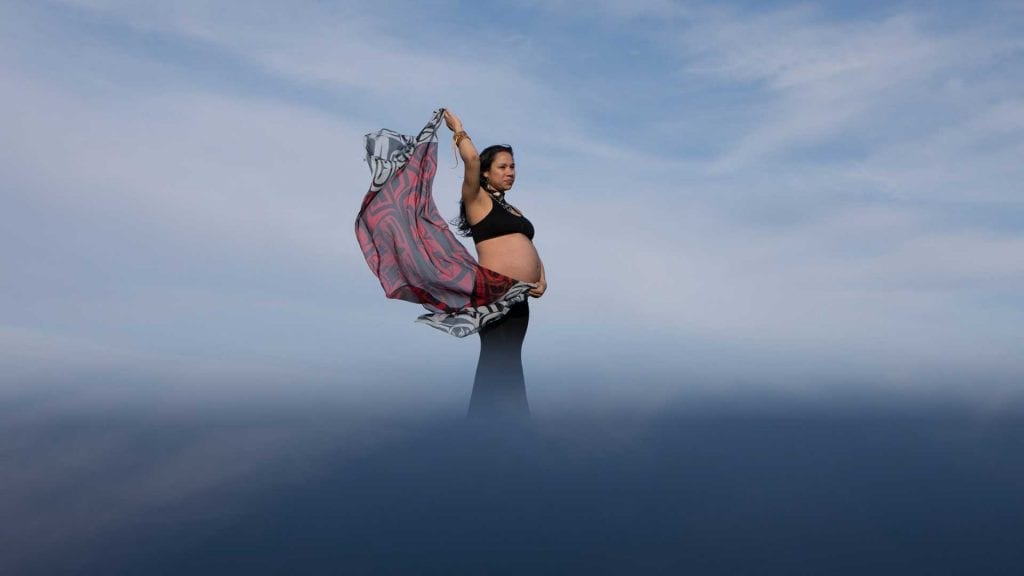
Photo taken by Melody Charlie Photography, courtesy of the BCAAFC.
Andrea Howard, founder and owner of Harbour City Doulas, recalls supporting an Indigenous mother who needed to transfer to Nanaimo from Ucluelet to give birth.
“Her first birth had been via cesarean, an experience she still felt upset by,” Howard wrote in an email to IndigiNews. “She told us that she felt bullied, ignored, and unsupported during her last birth, and that she wanted to make sure that her voice was heard and respected during her next birth.”
Anti-Indigenous racism is a well-documented problem in Canada’s health care system. In fact, the B.C. government recently launched an “independent investigation into Indigenous-specific racism in the province’s health care system.”
According to Howard, a doula’s role is to make sure individuals and families are supported ahead of, during and after birth — they are not directly involved in delivering babies.
Howard sees herself not only as someone who provides pregnancy, birth, and postpartum care, but also as an advocate for Indigenous families who may experience discrimination during the labour and delivery process.
“Having a doula can be very reassuring as we can provide much-needed continuity of care and support,” says Howard, who has been working in birth and newborn care for over 10 years.
Howard and the team of doula’s at Harbour City Doulas offer a range of “unbiased, judgement-free, and evidence based support,” according to its website.
Read More:
Indigenous nurse and birth worker advocates for more access to traditional support
Doulas are an optional service that typically people need to pay for out of pocket – their work isn’t covered by provincial health care services or most medical plans.
But because Howard is registered as a doula with the Doulas for Aboriginal Families Grant Program, Indigenous families in B.C. can access funding to cover the cost of her services.
The grant program, which began in 2013, aims to increase healthy birth outcomes for Indigenous families by providing up to $1,000 of doula support with each pregnancy.
The program represents a collaboration between the B.C. Association of Aboriginal Friendship Centres (BCAAFC), the Ministry of Health and the FNHA. To date, the program has paid for doulas in over 1,300 pregnancies, according to the BCAAFC.
Indigenous families who wish to hire a doula for support during their pregnancy can use the BCAAFC’s doula finder tool, or they can ask their doula to register with the program.
Leslie Varley, executive director of the BCAAFC, says that the grant program grew out of a commitment made in the 2005 Transformative Change Accord: First Nations Health Plan, which aimed to “improve health services for Aboriginal women and to bring birth support close to home and into the hands of women,” according to the organization’s website.
“It was just about recognition that Indigenous women have less access to birthing supports,” Varley says.
“Often, First Nations women coming from remote communities, particularly if it’s the first child, have to come into a, say a centre like Nanaimo or a birthing hospital, which are becoming fewer and fewer… and have to stay there for the last month to six weeks of their pregnancy and often can’t afford to bring family supports with them”.
Birth travel and isolation aren’t the only potential challenges for Indigenous women and families expecting a child.
Howard, the Nanaimo-based doula, says she’s witnessed healthcare professionals treating Indigenous people differently than they do non-Indigenous people in labour.
“Sometimes it’s something as simple as a labour and delivery nurse making a generalization about [an Indigenous] client that comes in,” she says.
“They might say oh, you know, ‘Has [the Ministry of Children and Family Development] been contacted?’ Or ’Have you done a screen on this person yet?’”
She says another question Indigenous people in labour might get is “do you know who the father is?”
Howard says she believes that doulas can support families that may be at a higher risk of discrimination and that a doula can help ensure pregnant women have the final say on their care plans.
“I think a lot of people feel like during the labour and birth experience that their power is removed from them,” Howard says. “Our priority is really to put the power back in their hands.”
Since registering with the doula grant grant program in 2018, Howard says her team has served approximately 75 Indigenous families.
As for the mother who travelled from Ucluelet, Howard says she witnessed her “transform from someone that felt afraid of birth and the health care system, into someone that felt empowered and confident about their voice and decisions.”











